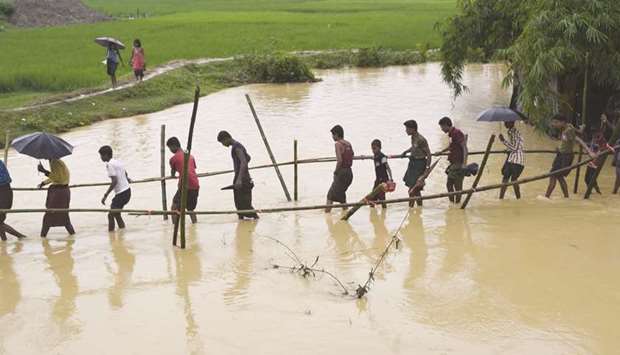With food and water shortages already making life tough, torrential rain brought back swamp-like conditions to many parts of the border town of Cox’s Bazar which has become a magnet for the Rohingya.
About 7.7cm (3 inches) of rain fell in 24 hours and more is predicted in the next two days, the Bangladesh Weather
Department said.
Bangladesh authorities, who have already issued travel restrictions on the Rohingya, launched an operation late Saturday to get tens of thousands out of roadside camps and hillside shanties into a giant new camp.
The United Nations says 409,000 Rohingyas have now overwhelmed Cox’s Bazar since August 25 when the military in Buddhist-majority Myanmar launched operations in Rakhine state.
As existing camps are already full with 300,000 Rohingya fleeing earlier violence, many of the Rohingya have been forced to live in the open air or under flimsy plastic sheets.
Police toured streets with loudspeakers ordering exhausted families to go to the Balukhali camp in Cox’s Bazar, which is being cleared to build new shelters.
“We are shifting them from the roadsides where many of them have been staying,” Khaled Mahmud, a government spokesman for Cox’s Bazar
district said.
Mahmud said gradually all the new Rohingya would be taken to Balukhali to bring order to the chaotic aid operation.
Yesterday, Myanmar’s government hinted that it may not take back Rohingya who fled across the border, accusing those refugees of having links to the militants.
“Those who fled the villages made their way to the other country for fear of being arrested as they got involved in the violent attacks. Legal protection will be given to the villages whose residents did not flee,” the government’s Information Committee statement said.
Previous statements have said the country will set up relief shelters in northern Rakhine for Muslims “who can guarantee they are in no way connected to the terrorists”.
On Saturday, Bangladesh police issued tough new orders banning the Rohingya from moving out of designated areas. The order even prevented them from taking shelter with friends and relatives.
Checkpoints have been set up at key transit points.
With thousands more Rohingya arriving each day, Bangladesh authorities fear the refugees could swamp other towns and cities across the country.
But the United Nations is already warning of intolerable conditions in the camps around Cox’s Bazar.
The rain “has doubled their misery”, said Mohammed Kai-Kislu, police chief at Ukhia near Cox’s Bazar, the new home for many Rohingya.
Aid workers said thousands of Rohingya were drenched by the return of the monsoon after a respite of a few days.
Arfa Begum and seven of her family tried to hide under rubber trees near the Balukhali settlement where they arrived five days earlier.
“They evicted us from the rubber plantation,” she said, referring to the police and border guards forcing the refugees out of makeshift shelters.
“It took hours to find a safe place. We were drenched,” she said.
Faced with a spreading mudbath, the Rohingya have started building bamboo carpets to get over flooded land.
A human rights expert in Cox’s Bazar urged the government to shut local schools for three days to allow the Rohingya to camp in them.
“It is another disaster unfolding. Thousands of Rohingya had no place to hide when the rain came,” Nur Khan Liton, who headed Bangladeshi rights group Ain O Salish Kendra, said.
He said moving the Rohingya from roadsides and open spaces should be halted as it was
compounding their troubles.
Conditions deteriorated for the Rohingya in what could be a key week in the crisis.
Bangladesh Prime Minister Sheikh Hasina has arrived at the UN General Assembly in New York to press for greater help coping with the refugees and put more pressure on Myanmar over the case.
She is to address the UN assembly on Thursday.

